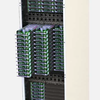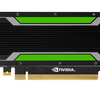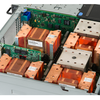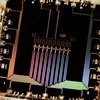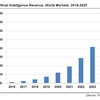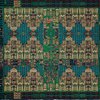At NVIDIAs first European GPU Technology Conference (GTC Europe) taking place in Amsterdam this week, CEO Jen-Hsun Huang announced a number of new users of the DGX-1 GPU-powered supercomputer in a box. Huang also teased attendees with an early look at one of their next-generation Volta GPUs designed to power self-driving cars.
Microsoft has revealed that Altera FPGAs have been installed across every Azure cloud server, creating what the company is calling the worlds first AI supercomputer. The deployment spans 15 countries and represents an aggregate performance of more than one exa-op. The announcement was made by Microsoft CEO Satya Nadella and engineer Doug Burger during the opening keynote at the Ignite Conference in Atlanta.
The path to exascale computing hasnt been an easy one. It has had to face a daunting set of challenges in energy efficiency, application parallelism, and system reliability, just to name a few. The difficulties in bringing the hardware and software up to this level is considerable, but there is a more fundamental challenge at the heart of exascale: doing the necessary work of building an ecosystem that will last for a decade or more, not just for a handful stunt machines.
Aquila, a system provider based in Albuquerque, New Mexico, has unveiled a new liquid-cooled server platform that offers one of the densest and most energy-efficient architectures in the market. The platform, known as Aquarius, uses a patented warm water cooling technology along with rack-level power distribution to minimize energy consumption and allow for very high levels of computational density.
NVIDIA has unveiled the Tesla P4 and P40, two new GPUs aimed at the very latest AI machinery. The processors are based on the companys Pascal architecture and incorporate new features aimed at deep learning inferencing work in areas likeimage and speech recognition, language translation, and recommendation engines. The announcement was made at NVIDIAs GPU Technology Conference taking place in Beijing, China this week.
IBM has unveiled what is probably the most powerful server the company has ever offered and one of the most computationally dense on the planet. The new S822LC for High Performance Computing, as it is called, is equipped with two IBM Power8 processors and four of NVIDIAs latest Tesla P100 GPUs. As such, IBM is first OEM to go to market with Pascal GPU-accelerated servers incorporating NVLink technology.
Over the years, there have been a torrent of breakthroughs in quantum computing research. But for the first time since in many years, the technology looks to be on the verge of fulfilling its promises. Thanks to an ambitious effort at Google, quantum computing may become a reality within the next two or three years. A report at the New Scientist unravels Googles plans to commercialize the technology and attain what the company is calling quantum supremacy.
A new report from market research firm Tractica forecasts that the annual global revenue for artificial intelligence products and services will grow from 643.7 million in 2016 to $36.8 billion by 2025, a 57-fold increase over that time period. As such, it represents the fastest growing segment of any size in the IT sector.
IBM is looking to take a bigger slice out of Intels lucrative server business with Power9, the companys latest and greatest processor for the datacenter. Scheduled for initial release in 2017, the Power9 promises more cores and a hefty performance boost compared to its Power8 predecessor. The new chip was described at the Hot Chips event, which took place in Silicon Valley this week.
The prospects for another serious rival to the x86 processor in the high performance computing space are looking much better this week after ARM Holdings presented the companys plan to offer an HPC version of its 64-bit architecture. Known as ARMv8-A SVE, the design incorporates a technology known as the Scalable Vector Extension (SVE), which will provide a unique type of flexibility with regard to vector processing -- the basis of many scientific and engineering workloads.




